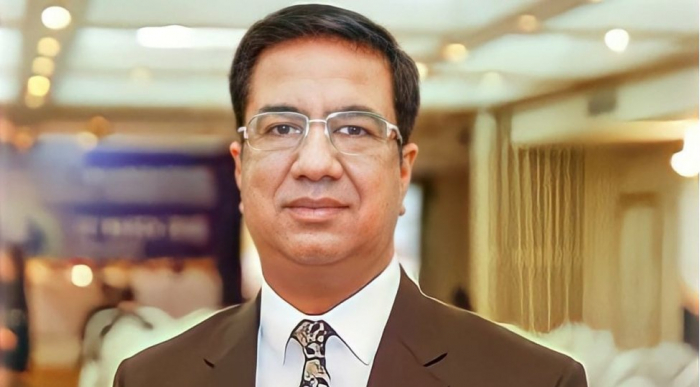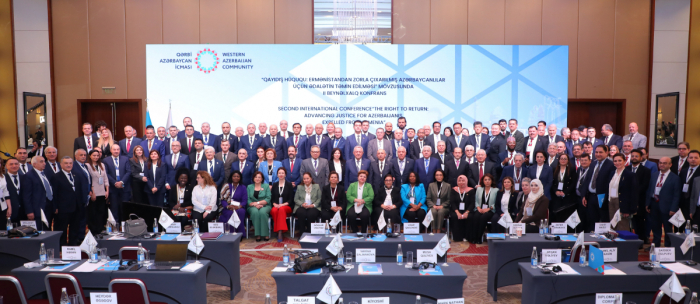In his address to the conference attendees, President Ilham Aliyev highlighted the enduring consequences of forcible displacement, affecting over 120 million people globally, including hundreds of thousands of Azerbaijanis expelled from their historical homeland in Western Azerbaijan, present-day Armenia. The deportations, occurring during distinct periods such as 1918–1921, 1948–1953, and 1987–1991, led to the complete ethnic cleansing of Azerbaijanis from Armenia, rendering it a mono-ethnic state. President Aliyev underscored that these deportations were accompanied by the systematic destruction of Azerbaijani cultural heritage, including mosques, cemeteries, and historical sites, in an attempt to erase Azerbaijani identity. President Aliyev emphasized that the Western Azerbaijan Community’s efforts represent a human rights issue rather than a threat to Armenia’s territorial integrity. He criticized Armenia’s portrayal of WAC activities as a threat, stating that such claims distort the true essence of the issue and deny the right to return enshrined in international law. The president also highlighted Armenia’s refusal to engage in dialogue with the Western Azerbaijan Community and called for international support to ensure the peaceful and dignified return of displaced Azerbaijanis.
Themes and Discussions
Experts provided a detailed analysis of the historical context of Azerbaijani displacement and the legal foundations of the right to return under international law. They cited instruments such as the Universal Declaration of Human Rights, the International Covenant on Civil and Political Rights, the Pinheiro Principles, and customary international law as critical frameworks supporting this right. Discussions focused on the necessity of justice as a precursor to reconciliation. Participants emphasized that Armenia must address historical injustices, cease glorifying perpetrators of crimes against Azerbaijanis, and engage in constructive dialogue with the Western Azerbaijan Community. Delegates called on global institutions, including the United Nations and the International Criminal Court (ICC), to play an active role in ensuring the safe and dignified return of Western Azerbaijanis. They also urged international organizations to investigate Armenia’s violations of international law and its obligations under the Rome Statute.
Panelists stressed the importance of restoring property rights for displaced Azerbaijanis. They urged the Armenian government to return confiscated or forcibly seized properties, provide compensation for losses incurred during displacement, and ensure comprehensive reparations. However, they emphasized that compensation cannot replace the right to return to ancestral lands. They expressed deep concern over Armenia’s systematic destruction of Azerbaijani cultural heritage and called for UNESCO and other international organizations to assess, protect, and restore these sites. Preserving cultural heritage was identified as a critical element for reconciliation and mutual understanding.
Key Outcomes
The conference reaffirmed the right to return as a fundamental human right, firmly anchored in international law. Participants highlighted the unacceptability of forced displacement and the importance of addressing historical injustices to achieve lasting peace and stability in the South Caucasus. Several key statements and outcomes emerged from the discussions:
· Call for Action by International Bodies: Participants urged the UN, ICC, and other global institutions to investigate Armenia’s actions and ensure accountability for violations of international law. They emphasized the need for a concerted international effort to facilitate the safe return of Western Azerbaijanis.
· Restitution and Reparations: The conference underscored the importance of restoring property rights, compensating for material and emotional losses, and ensuring fair reparations as part of the return process. However, these measures must not substitute or undermine the right to return.
· Cultural Heritage Preservation: Delegates called for international cooperation to protect Azerbaijani cultural heritage in Armenia. They viewed the destruction of mosques, cemeteries, and historical sites as an attempt to erase Azerbaijani identity and stressed the role of UNESCO in safeguarding these assets.
· Reconciliation and Coexistence: Justice was identified as a prerequisite for reconciliation. Participants called on Armenia to dismantle structures perpetuating discord, engage in dialogue with the Western Azerbaijan Community, and create conditions for coexistence and mutual trust.
· Diplomatic Efforts for Peace: Armenia was urged to align its policies with commitments to regional peace, including opening communications and embracing opportunities for economic and social cooperation. These measures were seen as essential for fostering shared prosperity and stability in the South Caucasus.
The conference highlighted the global relevance of forced displacement and its implications for human rights. The restoration of the right to return for Western Azerbaijanis was presented as a potential model for resolving similar issues worldwide. Delegates emphasized the need for comprehensive planning and resource allocation to restore infrastructure, provide humanitarian assistance, and implement long-term development programs in areas to which Western Azerbaijanis will return.
Ambassador Ramil Hasan has played a pivotal role in bringing the plight of Western Azerbaijanis to the global stage. Through his unwavering advocacy and diplomatic efforts, he has successfully highlighted their challenges, ensuring that the international community recognizes and addresses their concerns. His contributions have been instrumental in shaping global dialogue on the issue, garnering support from both regional and global players, and fostering meaningful discussions for long-term solutions. The participation of Mr. Khalid Taimur Akram in this international conference underscores the importance of global solidarity and collaborative engagement.
The event underscored the importance of international cooperation in addressing forced displacement and restoring the rights of affected communities. Participants expressed appreciation for the leadership of President Ilham Aliyev and the efforts of the Western Azerbaijan Community in promoting justice and reconciliation. They reaffirmed their commitment to advancing the right to return as a cornerstone of regional peace and stability. The peaceful, secure, and dignified return of Western Azerbaijanis is not only a policy priority but also a test of collective resolve to uphold human rights and dignity in the face of historical injustices.

Mr. Khalid Taimur Akram, Executive Director, Pakistan Research Center for a Community with Shared Future (PRCCSF), Islamabad, exclusively for AzVision.az
AzVision.az
More about:
















































